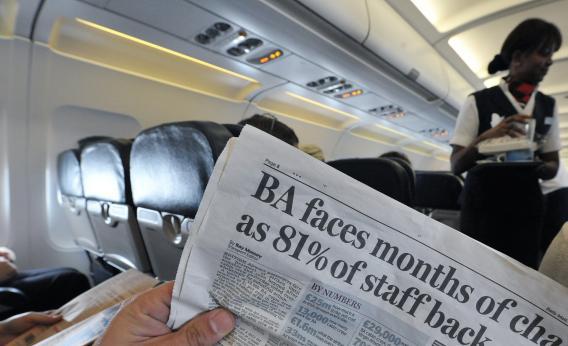If you’re flying to the United States from abroad, perhaps your newspapers should be confiscated along with your too-large tube of toothpaste. For your own protection, that is. After all, if you forget to discard that newspaper before going through customs on arrival, you may be guilty of copyright infringement.
As ridiculous as that may sound, that’s an interpretation of U.S. copyright law that’s on the table in a case to be argued before the Supreme Court on Oct. 29.
The case, Kirtsaeng v. John Wiley & Sons Inc., involves the textbook resale business of Supap Kirtsaeng, a native of Thailand who came to the United States as a student in 1997. Like many foreign students studying in the United States, he noticed that textbooks were available for much lower prices back home. Kirtsaeng had family members in Thailand make legal purchases of textbooks and ship them to him in the United States. Then, he sold them on sites such as eBay. In 2008, Wiley filed a copyright infringement complaint against Kirtsaeng. After a district court jury imposed damages of $75,000 per infringed work, Kirtsaeng appealed to the 2nd Circuit, which affirmed the decision, and then to the Supreme Court.
Whether Kirtsaeng’s actions constitute copyright infringement depends on the interplay between two separate copyright law provisions. Under the first sale doctrine, the owner of a copyrighted work “lawfully made under” U.S. copyright law can “sell or otherwise dispose of” it without getting permission from the holder of the copyright. So, if you legally purchase a Taylor Swift CD in the United States, you are free to lend it to a friend who lives down the street or sell it at your garage sale next spring. As the Supreme Court wrote in a 1998 decision, the “whole point of the first sale doctrine is that once the copyright owner places a copyrighted item in the stream of commerce by selling it, he has exhausted his exclusive statutory right to control its distribution.”
But if copyrighted goods cross international borders, things get more complex. There is a separate provision of U.S. copyright law that prohibits the importation into the United States, “without the authority of the owner of copyright,” of copies of a work “acquired outside the United States.” When these two provisions collide, which one trumps? In ruling on Kirtsaeng’s appeal, the 2nd Circuit held that “the first sale doctrine does not apply to copies manufactured outside of the United States.”
To put it mildly, this holding is problematic. To start with, it’s not always easy to know where something is manufactured. Taylor Swift and her record label are American, but suppose her CDs are “manufactured” in Asia. Does that mean you can’t lend the CD after all? What about items that we know are manufactured overseas? Are we committing willful infringement if we donate a Chinese-manufactured laptop computer to a neighborhood school?
And, when stripped of the safe harbor provided by the first sale doctrine, anyone who purchases copyrighted material abroad and then imports it to the United States, regardless of whether he or she plans to sell it, stands exposed to charges of copyright infringement. Which brings us back to reading materials on international flights.
You would think that the bookstores and newsstands in the airports in Toronto and London are fairly innocent enterprises. Yet, perhaps they are in infringement cahoots with the legions of airline passengers who purchase reading materials for their flights to the United States and—the gall—fail to abandon them on the plane when disembarking.
Even if, after reading this article, you vow to never again read on an international flight or buy skin care products (which have copyrighted labels) while on a trip to Europe, you aren’t out of the woods: There’s the potential to get caught up in the importation provision in the comfort of your own American home. After all, when you visit a foreign website, the text and other copyrighted content on that site are transferred to your computer. Of course, if you find yourself hauled into court for daring to read the BBC’s online site while in Poughkeepsie, you can argue that the BBC knew that it was serving content to an IP address in the United States and thus granted permission for the import.
It is tempting to conclude that even if bringing that copy of the Guardian home with you from overseas is technically against the law, no one will care. But, as some of the nation’s most venerable bookstores explained in an eloquently written amicus brief [PDF], there are “enough copyright owners out there—and enough crazy copyright lawsuits—that it is not always reasonable to rely on forbearance by copyright plaintiffs.” Good copyright law should not turn us all into infringers.
Now, Wiley has very good reasons for offering textbooks at lower cost overseas. A $60 textbook may appear somewhat expensive to an American student, but in countries with much lower per capita incomes, that might seem like a completely over-the-top $600. By selling textbooks at costs viewed as reasonable in a local context, publishers such as Wiley play a vital role in the education of students all over the world. A Supreme Court ruling that would reduce global access to American-produced educational materials would be a loss for us all.
Clearly, Congress should consider updating copyright law so that behaviors that everyone agrees are reasonable—offering lower-cost educational materials in less wealthy countries; buying a book in Heathrow airport and bringing it home—don’t become mutually exclusive. But for now the Supreme Court has to reconcile these issues within the confines of the law that’s already on the books. In Kirtsaeng v. John Wiley & Sons Inc., that may be quite a challenge.
